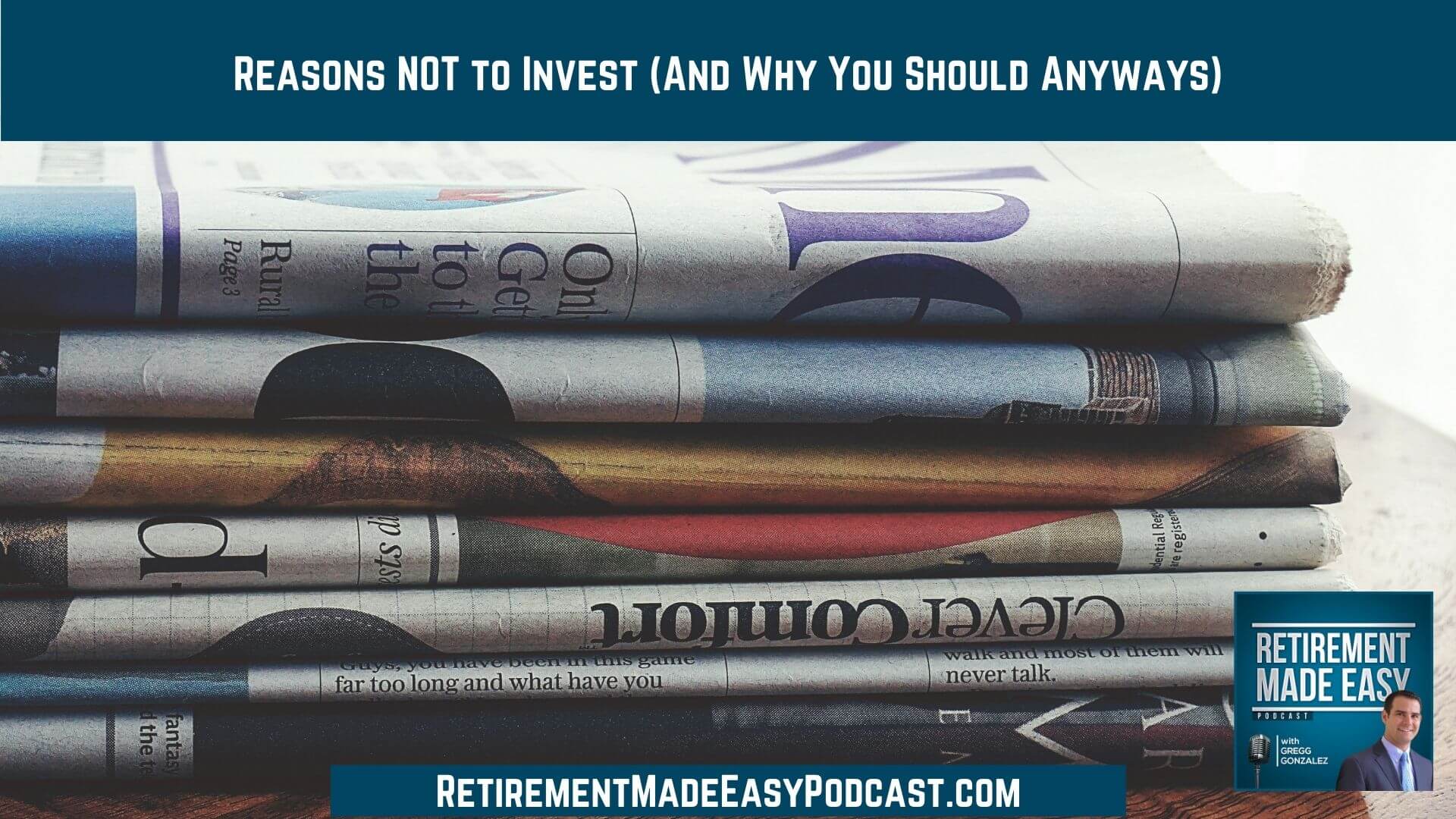
Every generation comes up with reasons not to invest. So in this episode of the Retirement Made Easy podcast, I share a historical perspective from the eyes of Baby Boomers, people born between 1946 and 1964 (approximately 70–80 million). The oldest Baby Boomer, born in 1946, is turning 75 this year. What’s happened in the economy since 1950? What has shaken the world and created fear in the minds of Americans?
You will want to hear this episode if you are interested in…
- [3:12] The uncertain economy we’re living in
- [4:50] Reasons not to invest in the ‘50s
- [7:10] Reasons not to invest in the ‘60s
- [8:10] Reasons not to invest in the ‘70s
- [9:20] Reasons not to invest in the ‘80s
- [10:42] Reasons not to invest in the ‘90s
- [11:29] Reasons not to invest in the ‘2000s
- [12:30] Reasons not to invest in the ‘2010s
- [13:31] Where we stand on investing today
Reasons not to invest in the stock market
Here are some of the events that happened in the last 70 years and how the Dow Jones reacted during those decades (The Dow Jones—30 of the largest US companies—was established in 1896).
- Reasons not to invest in the ‘50s: In 1950, the Dow Jones was priced at $198.89. The Korean War went on until 1953 and over 54,000 Americans died. In 1954, the Soviets dropped the first hydrogen bomb. Americans were terrified. Yet the Dow Jones was up 241%, ending at $679 at the end of 1959.
- Reasons not to invest in the ‘60s: In 1962, the Cuban missile crisis occurred—just 100 miles from Florida. The Civil Rights movement happened in the 60s. JFK, Bobby Kennedy, Malcolm X, and Martin Luther King were assassinated. In 1964 58,000 Americans died in the Vietnam war. With all of this horrible news, the Dow Jones opened in the 70s at $809 (up 20%).
- Reasons not to invest in the ‘70s: The ‘70s were horrible, with the greatest recession since the great depression of the 1920s/30s. The price of oil quadrupled from 1973 to 1974 because of the Opec Oil Embargo. In 1973, President Nixon resigned because of the Watergate Scandal. It devastated our country. The Dow Jones started at $809 and ended at $824, practically flat.
- Reasons not to invest in the ‘80s: What happened in the ‘80s? Technology was booming. We had 14% inflation, 21% mortgages, and 6.3% unemployment. Black Monday happened in 1987, where the stock market went down 23% in one day. In three months, the market lost 33.5% based mostly on fears that the US dollar was devaluing. Ronald Reagan was president. The Challenger exploded in the 80s. After everything that happened, the Dow Jones closed at $2,753—a 228% gain in one decade.
- Reasons not to invest in the ‘90s: Remember Y2K? The Gulf War? The Oklahoma City bombing? There was the Mexican currency crisis. Bill Clinton was impeached. At the end of the decade, the Dow Jones was priced at $11,497. It was a huge jump.
- Reasons not to invest in the 2000s: 9/11 happened in 2001. The war in the middle east was raging. The global war on terror began. Real estate closures were up 80% from 2008 to 2009. Unemployment peaked in October of 2009 at 10%. Hurricane Katrina hit in that decade as well. The Dow Jones opened at $11,357 and ended at $10,428 (considered the lost decade).
- Reasons not to invest in the ‘2010s: As we speak, the Coronavirus has been responsible for 688,000 deaths in the country. We saw the legalization of Marijuana. There was an attempt to impeach President Donald Trump. The Sandy Hook shooting happened, with 28 dead. 60 people died in the Las Vegas shooting. But from 2010 to 2020 the Dow Jones went from $10,583 to $28, 538.
All of these situations and political upheavals were valid reasons to worry about your investments. Yet in almost every decade the Dow Jones flourished.
Why you should still invest
Today, as I’m recording, the Dow Jones is around $35,000—it has done phenomenally well. But there will always be a headline out there, always reasons not to invest. The Dow Jones grew from $198 to $35,000 in one Baby Boomer’s lifetime. People lose sight of the resiliency of this country and the stock market.
Oak trees don’t grow overnight. Many don’t produce acorns until they’re 20+ years old. They go through storm after storm. But after enough time, they produce acorns and provide shade as large, beautiful trees.
There will always be something that can cause the market to turn down. Think about your 75-year-old friend. They’ve seen a lot. There were numerous reasons not to invest. But the Dow Jones flourished over time. My advice? Keep your focus on your long-term vision and goals. Keep your mind off the headlines. Don’t sacrifice your long-term goals because of short-term fears.
Connect With Gregg Gonzalez
- Email at: Gregg@RetireSTL.com
- Podcast: https://RetirementMadeEasyPodcast.com
- Website: https://StLouisFinancialAdvisor.com
- Follow Gregg on LinkedIn
- Follow Gregg on Facebook
- Follow Gregg on YouTube



